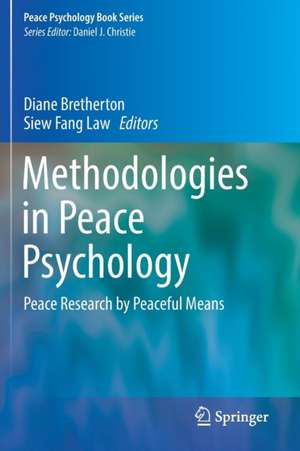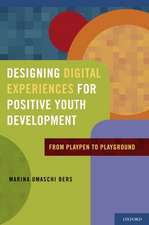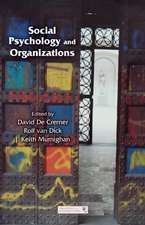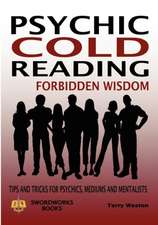Methodologies in Peace Psychology: Peace Research by Peaceful Means: Peace Psychology Book Series
Editat de Diane Bretherton, Siew Fang Lawen Limba Engleză Paperback – 26 sep 2017
Organized thematically, the volume begins with a review of the established best practices in peace psychology research methodology, including methods for qualitative research, for quantitative research, and participative action networks. In doing so, it also points to some of the limitations of working for peace within the tradition of a single discipline and to the need to expand psychology methodology, to methodologies. Therefore, the second half of the volume proceeds to explore the realm of innovative, relatively unorthodox research methods, such as participatory and workshop methods, the creative arts, and sports for research purposes. The use of new advances in information technology to conduct peaceful research are also discussed. The concluding chapters synthesize key issues from the previous chapters, and links peace psychology with ideas and implementation of research designs and practices. Finally, it discusses the nature of academic knowledge, and more specifically, academic knowledge in peace psychology, and where that fits into the mission to build a more peaceful world.
Overall this book aims to provide peace psychologists with an array of possibilities and best practices for approaching their research. Many researchers find the experience of doing research a somewhat lonely, if not isolating, experience. Methodologies in Peace Psychology: Peace Research by Peaceful Means aims to alleviate this feeling as the use ofthese more innovative methods leads to a closer engagement with the community and a much more social experience of research. This volume is a useful tool for both new and experienced researchers because it provides leads for idealistic young researchers who want their work to make a difference, in addition to encouraging more reflection and analysis for experienced peace psychologists.
| Toate formatele și edițiile | Preț | Express |
|---|---|---|
| Paperback (2) | 398.74 lei 43-57 zile | |
| Springer International Publishing – 22 oct 2016 | 398.74 lei 43-57 zile | |
| Springer International Publishing – 26 sep 2017 | 398.74 lei 43-57 zile | |
| Hardback (1) | 406.42 lei 43-57 zile | |
| Springer International Publishing – 11 sep 2015 | 406.42 lei 43-57 zile |
Din seria Peace Psychology Book Series
- 18%
 Preț: 779.26 lei
Preț: 779.26 lei -
 Preț: 361.05 lei
Preț: 361.05 lei - 15%
 Preț: 639.25 lei
Preț: 639.25 lei - 18%
 Preț: 788.54 lei
Preț: 788.54 lei - 15%
 Preț: 699.28 lei
Preț: 699.28 lei - 15%
 Preț: 646.62 lei
Preț: 646.62 lei - 18%
 Preț: 1690.13 lei
Preț: 1690.13 lei - 15%
 Preț: 645.28 lei
Preț: 645.28 lei - 24%
 Preț: 1044.84 lei
Preț: 1044.84 lei - 18%
 Preț: 945.14 lei
Preț: 945.14 lei - 15%
 Preț: 649.54 lei
Preț: 649.54 lei -
 Preț: 386.39 lei
Preț: 386.39 lei - 15%
 Preț: 697.82 lei
Preț: 697.82 lei - 15%
 Preț: 591.14 lei
Preț: 591.14 lei - 18%
 Preț: 1222.94 lei
Preț: 1222.94 lei - 15%
 Preț: 644.82 lei
Preț: 644.82 lei - 15%
 Preț: 649.22 lei
Preț: 649.22 lei - 15%
 Preț: 697.65 lei
Preț: 697.65 lei -
 Preț: 388.72 lei
Preț: 388.72 lei - 15%
 Preț: 647.08 lei
Preț: 647.08 lei - 24%
 Preț: 967.02 lei
Preț: 967.02 lei - 15%
 Preț: 638.89 lei
Preț: 638.89 lei - 15%
 Preț: 650.37 lei
Preț: 650.37 lei - 18%
 Preț: 733.15 lei
Preț: 733.15 lei - 15%
 Preț: 644.30 lei
Preț: 644.30 lei - 18%
 Preț: 1116.57 lei
Preț: 1116.57 lei -
 Preț: 365.05 lei
Preț: 365.05 lei - 15%
 Preț: 643.99 lei
Preț: 643.99 lei - 18%
 Preț: 1116.26 lei
Preț: 1116.26 lei - 18%
 Preț: 1381.26 lei
Preț: 1381.26 lei - 18%
 Preț: 1595.75 lei
Preț: 1595.75 lei - 18%
 Preț: 779.89 lei
Preț: 779.89 lei
Preț: 398.74 lei
Nou
Puncte Express: 598
Preț estimativ în valută:
76.30€ • 79.88$ • 63.13£
76.30€ • 79.88$ • 63.13£
Carte tipărită la comandă
Livrare economică 07-21 aprilie
Preluare comenzi: 021 569.72.76
Specificații
ISBN-13: 9783319685250
ISBN-10: 3319685252
Pagini: 454
Ilustrații: XXV, 454 p. 20 illus., 11 illus. in color.
Dimensiuni: 155 x 235 mm
Greutate: 0.67 kg
Ediția:1st ed. 2015
Editura: Springer International Publishing
Colecția Springer
Seria Peace Psychology Book Series
Locul publicării:Cham, Switzerland
ISBN-10: 3319685252
Pagini: 454
Ilustrații: XXV, 454 p. 20 illus., 11 illus. in color.
Dimensiuni: 155 x 235 mm
Greutate: 0.67 kg
Ediția:1st ed. 2015
Editura: Springer International Publishing
Colecția Springer
Seria Peace Psychology Book Series
Locul publicării:Cham, Switzerland
Cuprins
Acknowledgement.- Contributors.- Chapter 1 Introduction: Methodologies in Peace Psychology.- Part I Research Methods in Peace Psychology.- Chapter 2 Theories Underlying Peace Research .- Chapter 3 Themes in Peace Psychology Research.- Chapter 4 Quantitative Research in Peace Psychology.- Chapter 5 Qualitative Research in Peace Psychology.- Chapter 6 Utilizing Mixed Methods for Research in Peace Psychology.- Chapter 7 Ethical Objectives and Values in Peace Psychology and Social Justice Research.- Part II Extending the Range of Methodologies.-Postcolonial Methodologies.- Chapter 8 Indigenous Paradigm Research.- Chapter 9Approaches to Postcolonial Research.- Chapter 10 Involving Participants in Data Analysis.- Participatory and Workshop Methods.- Chapter 11 Philosophies of Participation: Analectic and Consciousness Methods.- Chapter 12 Participatory Action Research as a Resource for Community Regeneration in Post-Conflict Contexts.- Chapter 13 Inquiry into Practice and Practicing Inquiry:the Intersection of Practice Intervention and Research.- Using the Creative Arts in Peace Research.- Chapter 14 Approaches to Narrative Analysis: Using Personal, Dialogical and Social Stories to Promote Peace.- Chapter 15 Challenging Structural Violence through Community Drama: Exploring Theatre as Transformative Praxis.- Chapter 16 Photovoice as Emancipatory Praxis: A Visual Methodology Towards Critical Consciousness and Social Action.- Chapter 17 Music and Peace.- Technological Innovation.- Chapter 18 Using the Internet and Social Media in Peace Psychology Research.- Part III Transforming the world.- Chapter 19 Translating Psychological Research into Policy, Advocacy and Programs in International Development.- Chapter 20Program Evaluation: Why Process Matters.- Chapter 21Writing Peace Psychology: Creating High-Impact Peace Research Scholarship.- Chapter 22 Conclusion: Peaceful Research by Peaceful Means.- List of Tables.- List of Figures.- Index.
Notă biografică
Diane Bretherton was the founding director of the International Conflict Resolution Centre in the Pyschology Department at the University of Melbourne and for many years chaired the Committee for the Psychological Study of Peace of the International Union of Psychological Science. She is currently an Honorary Professor in Political Science and International Relations at the University of Queensland. She is also a Visiting Professor at the Zhou En Lai School of International Relations at the University of Nankai in Tianjin, China. She has previously contributed to the Springer Series in Peace Psychology as a co-editor of Peace Psychology in Australia and is a member of the Editorial Advisory Board of the Journal of Peace and Conflict. She has conducted conflict resolution and peace building workshops in many countries in the world, her most recent project being to facilitate a dialogue between indigenous (Mapuche) and non-indigenous people in Chile. She was awarded the Morton Deutsch Award for Research in Conflict Resolution by the American Psychological Association, Washington, in 2011. She has also been made a member of the Order of Australia for theoretical contributions her discipline and for the practical prevention of violence through promoting conflict resolution in the community. Her extensive experience of supervising the research of under-graduate and post-graduate psychology students who wished to make a contribution to the prevention of violence and promotion of peace, within the Psychology Department at the University of Melbourne, informs the proposed book.
Siew Fang Law is of Chinese Malaysian descent and received her education in four continents. She is a Senior Lecturer and teaches in conflict resolution and peace at Victoria University, Australia. Her doctoral education was in culture and conflict resolution at RMIT University in Melbourne, Australia. She completed her Masters of Science in Social Psychology at the University of Kent in Canterbury, UK and Bachelor of Arts in Psychology at St Marys University, Canada. Prior receiving her tenure position at Victoria University, she worked a consultant for international organizations such as UNDP and UNESCO in Southeast Asia and had taught at RMIT. She researches in cross-disciplinary issues that fall into the intersections of culture and conflict resolution, identity, post-colonialism, community development and peacebuilding. She is a nationally Accredited Mediator in Australia and a committee member of the Committee for the Psychological Study of Peace
Siew Fang Law is of Chinese Malaysian descent and received her education in four continents. She is a Senior Lecturer and teaches in conflict resolution and peace at Victoria University, Australia. Her doctoral education was in culture and conflict resolution at RMIT University in Melbourne, Australia. She completed her Masters of Science in Social Psychology at the University of Kent in Canterbury, UK and Bachelor of Arts in Psychology at St Marys University, Canada. Prior receiving her tenure position at Victoria University, she worked a consultant for international organizations such as UNDP and UNESCO in Southeast Asia and had taught at RMIT. She researches in cross-disciplinary issues that fall into the intersections of culture and conflict resolution, identity, post-colonialism, community development and peacebuilding. She is a nationally Accredited Mediator in Australia and a committee member of the Committee for the Psychological Study of Peace
Textul de pe ultima copertă
Our world appears to be in endless crisis and increasingly people wonder if they can do something to make a difference. But what role should researchers take? Can we sit aside from the problems of the world or should we be actively engaged in social transformation? Are we equipped to deal with the challenges of the 21st century? Can we help to build a more peaceful world? Perhaps it is time for us to re-imagine the nature of research and its relationship to the increasingly complex problems of the world.
This unique and timely book describes existing methods of inquiry in psychology, and then explores innovative approaches that use interactive workshops, the creative arts and the social media to more actively engage with communities in building peaceful relationships. Organized thematically, the volume begins with a review of the established best practices in peace psychology, including methods for quantitative, qualitative and mixed methods
designs. The core argument is that peace research should be conducted by peaceful means, and should model peaceful processes. In exploring this argument, the volume points to some of the limitations of working for peace within the tradition of a single discipline and to the need to expand psychology methodology, to methodologies. The compilation of chapters, from authors in different parts of the world gives inspiration to readers to create their own innovative, reliable and context appropriate research designs, ones that could make a real difference. Traditional research approaches have provided a strong foundation, particularly in understanding the nature of violence, but in the 21st century researchers will need to reach out to a wider range of cultural groups, to be more active in building peaceful communities and societies, and so be more creative in their approach. Creativity is essential in conflict resolution, in peace building and in peace research. The concluding chapters synthesize key issues from the previous chapters, and raise ideas for the future implementation of research designs and practices. Finally, the book discusses the nature of academic knowledge, and more specifically, academic knowledge in peace psychology, and where it fits into the mission to build a more peaceful world. Methodologies in Peace Psychology: Peace Research by Peaceful Means is a useful tool for both new and experienced researchers because it provides leads for idealistic young researchers who want their work to make a difference, in addition to encouraging more reflection and analysis for experienced peace psychologists.
This unique and timely book describes existing methods of inquiry in psychology, and then explores innovative approaches that use interactive workshops, the creative arts and the social media to more actively engage with communities in building peaceful relationships. Organized thematically, the volume begins with a review of the established best practices in peace psychology, including methods for quantitative, qualitative and mixed methods
designs. The core argument is that peace research should be conducted by peaceful means, and should model peaceful processes. In exploring this argument, the volume points to some of the limitations of working for peace within the tradition of a single discipline and to the need to expand psychology methodology, to methodologies. The compilation of chapters, from authors in different parts of the world gives inspiration to readers to create their own innovative, reliable and context appropriate research designs, ones that could make a real difference. Traditional research approaches have provided a strong foundation, particularly in understanding the nature of violence, but in the 21st century researchers will need to reach out to a wider range of cultural groups, to be more active in building peaceful communities and societies, and so be more creative in their approach. Creativity is essential in conflict resolution, in peace building and in peace research. The concluding chapters synthesize key issues from the previous chapters, and raise ideas for the future implementation of research designs and practices. Finally, the book discusses the nature of academic knowledge, and more specifically, academic knowledge in peace psychology, and where it fits into the mission to build a more peaceful world. Methodologies in Peace Psychology: Peace Research by Peaceful Means is a useful tool for both new and experienced researchers because it provides leads for idealistic young researchers who want their work to make a difference, in addition to encouraging more reflection and analysis for experienced peace psychologists.
Caracteristici
Presents innovative methodologies and best practices for conducting psychological peace research in a wide variety of contexts Provides ideas for some of the alternative, arts-based research methods in psychology Offers a range of creative and sound tips on how to conduct research with people whose worldview might differ considerably from that of the researchers Includes supplementary material: sn.pub/extras












